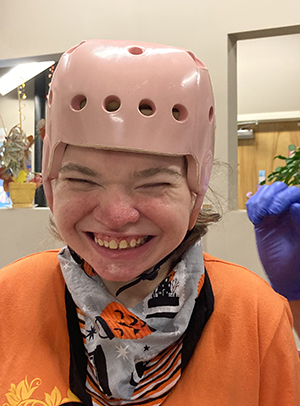Patient StoryOct | 22 | 2021
Amy’s story: Community location ensures young woman receives critical post-transplant care



At their town’s local Fourth of July celebrations, Amy Hammond sat alongside her mother, Patty Searles, to watch the fireworks. A boom rattled through her ears and an explosion of color filled the sky. “Yeah! Yeah!” she said, raising her arms in delight. It’s the happiest that Patty had seen her daughter in months after an incredible, life-saving surgery.
When Amy, 26, of Rehoboth, Mass., was in her teens, she was diagnosed with kidney failure. For about 10 years, Amy’s family and her doctors kept her condition stable even though the cause of the kidney failure was unknown. When Amy, who is non-verbal and uses a wheelchair for mobility, was 24, her condition quickly progressed from stage 3 kidney failure to stage 4.
At that point, the best treatment option for Amy, who also has tuberous sclerosis complex (TSC), was a kidney transplant. TSC is a rare, congenital genetic condition that causes benign (non-cancerous) tumors or cysts on multiple organs throughout the body. In Amy’s case, this included her kidneys. Upon hearing the news, Amy’s sister, Kayla, volunteered to donate one of her kidneys to her sister.
“Because I’d done so much research about transplants and organ donation, I knew the wait for an organ was going to be very long,” said Kayla, 28, of Somerset, Mass. “I knew Amy wouldn’t be able to do dialysis and even though I knew there was a 1 in 4 chance that I’d be a match for her, I still wanted to do it.”
To everyone’s surprise, Kayla was a perfect match for Amy. Both women had surgery on March 10, 2020, just three days before the entire nation was plunged into lockdown amid the COVID-19 pandemic. The surgery was scheduled just 11 days after Amy’s condition progressed even further to stage 5 kidney failure.
About five hours later, surgeons successfully transplanted one of Kayla’s kidneys into Amy. Since part of Kayla’s kidney was slightly smaller than what Amy needed, doctors put in a stent to widen it. Both sisters recovered on the same floor, which made it easier for Kayla to visit Amy’s room after surgery. Kayla went home two days after surgery while Amy went home three days after.

“Everything was closed and because we were at the hospital, we weren’t really tuned into what was going on outside. Amy is an amazing patient and everyone on her care team is amazing,” said Patty. “There isn’t one negative thing to say about them. We always felt in the loop and informed.”
In the months after transplant surgery, all transplant patients need weekly and bi-weekly bloodwork to make sure their bodies are not rejecting the new organ. With hospitals and businesses in lockdown, Weizhen Tan, MD, Amy’s nephrologist, asked if their family would like to have bloodwork and future appointments scheduled at one of MGfC’s community locations in Foxborough, Mass., just half an hour from the Hammond’s home. This would be much closer than coming into Boston for Amy’s care.
“We had to be creative and provide the same care, but with the added challenge of COVID,” said Tan, of Pediatric Nephrology at MGfC. “We had a great option with scheduling virtual visits with me and by sending Amy to my office at our Foxborough location for blood work and in-person visits when needed.”
Since Amy’s transplant, Tan has been a key provider on her care team, whether the family came to Boston or Foxborough. “The moment we met Dr. Tan, I knew he was special. In the year and a half dealing with him with every single issue we had, he has been there and answered all my calls within minutes,” said Patty. “He’s a pediatric nephrologist, so technically, Amy should be seeing an adult nephrologist, but he had stayed with us. He’s the person I have leaned on and trusted Amy with. I know at some point we will have to transition Amy to an adult nephrologist, but as Dr. Tan has said many times, we will cross that bridge when we get to it.”
The year following Amy’s surgery was challenging. Amy was hospitalized five times –once for her initial transplant surgery, twice to treat urinary tract infections (UTI) caused by the stent, once for surgery to have the stent removed and once more for surgery to remove both of her own sick kidneys. Once the stent was removed, Amy no longer had UTIs and felt better than she had in months.
Now, Amy is doing incredibly well. “Eventually, Dr. Tan said he only needed to see Amy four times a year, which is two in-person visits and two virtual visits, and to just keep up with the blood work,” said Patty. “Her seizures have subsided, and her medications have been adjusted. She has so much energy now and is engaged with every conversation. The difference is amazing.”
Related Pages
Type
Centers and Departments
Appointments and Referrals
Request an appointment or second opinion, refer a patient, find a doctor or view test results with MGfC's secure online services.

